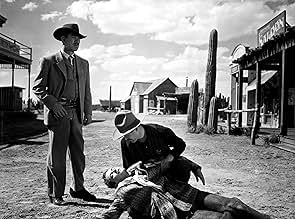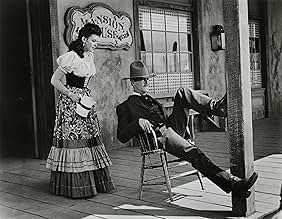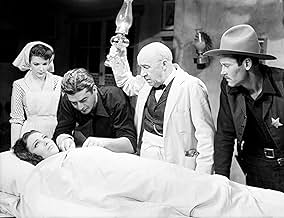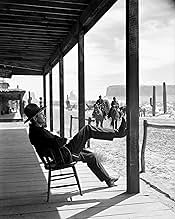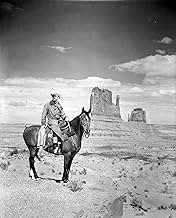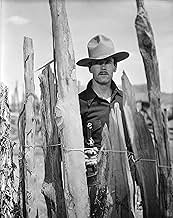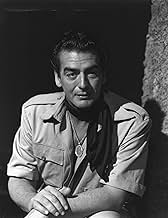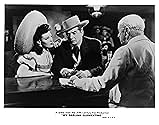VALUTAZIONE IMDb
7,7/10
27.453
LA TUA VALUTAZIONE
I clan degli Earp e dei Clanton si scontrano all'OK Corral a Tombstone, Arizona.I clan degli Earp e dei Clanton si scontrano all'OK Corral a Tombstone, Arizona.I clan degli Earp e dei Clanton si scontrano all'OK Corral a Tombstone, Arizona.
- Regia
- Sceneggiatura
- Star
- Premi
- 3 vittorie totali
Robert Adler
- Stagecoach Driver
- (non citato nei titoli originali)
C.E. Anderson
- Townsman
- (non citato nei titoli originali)
Don Barclay
- Opera House Owner
- (non citato nei titoli originali)
Hank Bell
- Opera House Patron
- (non citato nei titoli originali)
Recensioni in evidenza
Set amid the sweeping vistas and the towering sandstone buttes and spires of Monument Valley, this John Ford film, about Wyatt Earp (Henry Fonda) and his encounters with the Clanton gang in rowdy Tombstone, Arizona, fulfills our need to experience the Old West as mythic romanticism. The visuals are striking. El Greco skies oppress a majestic and lonesome landscape of rock, dirt, dust, and cattle. Ghostly human figures confront death in heavy rain. Indoors, small, overhead lanterns emit soft light in tough barrooms. The B&W cinematography conveys a somber, moody, idealized vision of the nineteenth century American frontier.
But the film's romanticism is not just the product of adroit cinematography. The relaxed narrative weaves multiple, seemingly insignificant plot lines into a unified whole, and thus depicts the Old West as a place and time of humor, wit, religious faith, amiable conflict, even poetry and philosophy.
And so, in his heartfelt soliloquy of "the undiscovered country", Granville Thorndyke (Alan Mowbray), that congenial thespian rogue who quotes Shakespeare and who seems so out of place, adds texture and soul to the script, as a precursor to violence and death. This is after all ... Tombstone.
Inspired by the real life gunfight at the OK Corral, the story is less factual than suggestive. It's not just the film's fanciful portrayal of the shootout that abets credulity. It's the setting ... Tombstone is nowhere near Monument Valley.
But this is not a textbook. It is a romanticized cinematic interpretation of a long-ago culture, using a textbook incident as a premise. The film's theme centers on the nobility of outcasts and the basic goodness and humanism of frontier people. It's a broad-brush character study of historical figures like Doc Holliday (Victor Mature), Old Man Clanton (Walter Brennan), the Clanton sons, and of course Wyatt Earp and his sons. Although one could argue that Fonda lacks the tough guy strength and roughness that we would expect for a frontier legend, the casting and the acting are overall quite good. Editing, costumes, and production design also enhance the film's credibility.
Understated and meditative in tone, "My Darling Clementine" is a different kind of Hollywood western, one that conveys a humanistic theme with emotional depth. Characters are multi-dimensional, unvarnished, and as striking and memorable as the stately buttes and spires of Monument Valley.
But the film's romanticism is not just the product of adroit cinematography. The relaxed narrative weaves multiple, seemingly insignificant plot lines into a unified whole, and thus depicts the Old West as a place and time of humor, wit, religious faith, amiable conflict, even poetry and philosophy.
And so, in his heartfelt soliloquy of "the undiscovered country", Granville Thorndyke (Alan Mowbray), that congenial thespian rogue who quotes Shakespeare and who seems so out of place, adds texture and soul to the script, as a precursor to violence and death. This is after all ... Tombstone.
Inspired by the real life gunfight at the OK Corral, the story is less factual than suggestive. It's not just the film's fanciful portrayal of the shootout that abets credulity. It's the setting ... Tombstone is nowhere near Monument Valley.
But this is not a textbook. It is a romanticized cinematic interpretation of a long-ago culture, using a textbook incident as a premise. The film's theme centers on the nobility of outcasts and the basic goodness and humanism of frontier people. It's a broad-brush character study of historical figures like Doc Holliday (Victor Mature), Old Man Clanton (Walter Brennan), the Clanton sons, and of course Wyatt Earp and his sons. Although one could argue that Fonda lacks the tough guy strength and roughness that we would expect for a frontier legend, the casting and the acting are overall quite good. Editing, costumes, and production design also enhance the film's credibility.
Understated and meditative in tone, "My Darling Clementine" is a different kind of Hollywood western, one that conveys a humanistic theme with emotional depth. Characters are multi-dimensional, unvarnished, and as striking and memorable as the stately buttes and spires of Monument Valley.
If you're looking for a straight-forward, fairly factual presentation of the events leading up to the 'Gunfight at the O.K. Corral', watch 'Wyatt Earp', or 'Tombstone'...But if you prefer your history more spiritual, and want to see a master storyteller paint a visual canvas of a West that may never have existed, but SHOULD have, then this film should be a treasured part of your video collection!
John Ford knew Wyatt Earp personally, and was familiar with the events surrounding the Tombstone shootout, but one of his greatest assets as a director was his ability to look beyond simple facts, and focus on what 'made' a legend. 'My Darling Clementine' is a story of icons, of Loners, accepting their own weaknesses and limitations, yet willing to risk their lives and abilities to aid others, then to walk away, allowing Civilization to grow. It's a classic theme of most great westerns, particularly in Ford's work (he would return to it in 'The Searchers', and 'The Man Who Shot Liberty Valance'), as well as other directors ('Shane', 'A Fistful of Dollars', 'Unforgiven', and 'Open Range' are a few examples).
Wyatt Earp (wonderfully portrayed by Henry Fonda) and his brothers have an aloofness that makes their characters both deceptively simple, yet enigmatic at the same time. At the film's start, Wyatt's a cowpuncher who had walked away from the responsibilities of being a lawman, finding satisfaction with his brothers in the hard work and solitary life of the range. When the Clantons (led by Walter Brennan, in one of his greatest, yet most vicious roles), first approach the brothers on the range, they accept the old man's invitation to get a taste of city life, but it's clear that it will only be a brief stay before they move on, and Wyatt brushes aside any overtures of friendship.
Wyatt's lack of desire to commit to a larger community is stressed when he subdues an armed, drunken Indian with his bare hands in a saloon (based on an actual event in Earp's life), then turns down the city council's plea to accept the Marshall's badge. Only after a brother is murdered do the Earp brothers decide to clean up the town, as it had become 'personal'.
In counterpoint to Earp is another 'loner', Doc Holliday (sensitively portrayed by Victor Mature), an intellectual who fled the South, and had found his solitude through his guns, his gambling, and his illness. While Wyatt is a true 'Man of the West', however, Holliday is simply a lonely man with no place to go, only comfortable at a poker table. He is doomed, more by his own shrinking world, than by the disease that forces him to cough into his handkerchief.
The scenes of Wyatt in Tombstone are wonderful, as Civilization grows up around the uncomfortable stranger. Yet he toys with the idea of settling into this world, through his polite yet obvious attraction to Doc's lost love, Clementine. The scene of the outdoor church dance, where the stiffly formal Earp dances against the vista of a West being 'boarded in' is symbolic of what his own life, and the West, itself, was becoming, and is classic Ford!
The climactic shootout at the O.K. Corral is both powerful and raw, ultimately fulfilling the Earps' commitment to a world that needed their aid, and ending the downward spiral of Holliday's life, in a heroic and theatrical gesture.
It's often asked why Wyatt leaves, afterward, when Clementine and Tombstone are so attractive...The answer is simple, really; his work is finished, and his participation was no longer necessary. Civilization could now grow, unimpeded. The Loner would have no place there. Like Ethan, or Shane, or 'The Man With No Name', he must return to the solitary vistas that are his true home.
John Ford has truly created the 'Stuff of Legends' with this beloved classic!
John Ford knew Wyatt Earp personally, and was familiar with the events surrounding the Tombstone shootout, but one of his greatest assets as a director was his ability to look beyond simple facts, and focus on what 'made' a legend. 'My Darling Clementine' is a story of icons, of Loners, accepting their own weaknesses and limitations, yet willing to risk their lives and abilities to aid others, then to walk away, allowing Civilization to grow. It's a classic theme of most great westerns, particularly in Ford's work (he would return to it in 'The Searchers', and 'The Man Who Shot Liberty Valance'), as well as other directors ('Shane', 'A Fistful of Dollars', 'Unforgiven', and 'Open Range' are a few examples).
Wyatt Earp (wonderfully portrayed by Henry Fonda) and his brothers have an aloofness that makes their characters both deceptively simple, yet enigmatic at the same time. At the film's start, Wyatt's a cowpuncher who had walked away from the responsibilities of being a lawman, finding satisfaction with his brothers in the hard work and solitary life of the range. When the Clantons (led by Walter Brennan, in one of his greatest, yet most vicious roles), first approach the brothers on the range, they accept the old man's invitation to get a taste of city life, but it's clear that it will only be a brief stay before they move on, and Wyatt brushes aside any overtures of friendship.
Wyatt's lack of desire to commit to a larger community is stressed when he subdues an armed, drunken Indian with his bare hands in a saloon (based on an actual event in Earp's life), then turns down the city council's plea to accept the Marshall's badge. Only after a brother is murdered do the Earp brothers decide to clean up the town, as it had become 'personal'.
In counterpoint to Earp is another 'loner', Doc Holliday (sensitively portrayed by Victor Mature), an intellectual who fled the South, and had found his solitude through his guns, his gambling, and his illness. While Wyatt is a true 'Man of the West', however, Holliday is simply a lonely man with no place to go, only comfortable at a poker table. He is doomed, more by his own shrinking world, than by the disease that forces him to cough into his handkerchief.
The scenes of Wyatt in Tombstone are wonderful, as Civilization grows up around the uncomfortable stranger. Yet he toys with the idea of settling into this world, through his polite yet obvious attraction to Doc's lost love, Clementine. The scene of the outdoor church dance, where the stiffly formal Earp dances against the vista of a West being 'boarded in' is symbolic of what his own life, and the West, itself, was becoming, and is classic Ford!
The climactic shootout at the O.K. Corral is both powerful and raw, ultimately fulfilling the Earps' commitment to a world that needed their aid, and ending the downward spiral of Holliday's life, in a heroic and theatrical gesture.
It's often asked why Wyatt leaves, afterward, when Clementine and Tombstone are so attractive...The answer is simple, really; his work is finished, and his participation was no longer necessary. Civilization could now grow, unimpeded. The Loner would have no place there. Like Ethan, or Shane, or 'The Man With No Name', he must return to the solitary vistas that are his true home.
John Ford has truly created the 'Stuff of Legends' with this beloved classic!
It's 1882. Wyatt Earp (Henry Fonda) and his brothers are driving cattle to California when they encounter Old Man Clanton who tries to buy their cattle with a low-ball offer. Wyatt kindly rejects the offer. The Earps stop at Tombstone to find a lawless town. Their cattle gets stolen and Wyatt's youngest brother James is murdered by unknown assailants. Wyatt suspects the Clantons and takes the job of town marshal. Volatile gambler Doc Holliday (Victor Mature) returns to town. Doc's past Clementine Carter (Cathy Downs) tracks him down all the way from Boston despite his refusal for her help. Doc's present day friend Chihuahua (Linda Darnell) is not happy with her presence.
I really love the start and Henry Fonda can do no wrong especially as a stoic heroic lead. I have a bit of an issue with Victor Mature. I can't forget Val Kilmer playing the role who is so much more fun. Mature is more angry than sickly. As for the iconic shootout, again I really love the start. Monument Valley looks epic in the background. I love the slow walk up to the OK Corral. Then the action isn't quite as epic. Director John Ford would say that he extended it from a 30 seconds fight but it doesn't really measure up to modern action scenes. All in all, this is a classic for its time.
I really love the start and Henry Fonda can do no wrong especially as a stoic heroic lead. I have a bit of an issue with Victor Mature. I can't forget Val Kilmer playing the role who is so much more fun. Mature is more angry than sickly. As for the iconic shootout, again I really love the start. Monument Valley looks epic in the background. I love the slow walk up to the OK Corral. Then the action isn't quite as epic. Director John Ford would say that he extended it from a 30 seconds fight but it doesn't really measure up to modern action scenes. All in all, this is a classic for its time.
I'm not a huge fan of westerns, but the info on this from IMDb drew me
to watch it when it showed up on American Movie Classics, and I was
richly rewarded. This is truly a beautifully done film, and makes one
understand John Ford's reputation in this genre. The understated Henry
Fonda and the volcanic Victor Mature somehow work well against each
other. The script is low-key and naturalistic, allowing the action to
stand out. The cinematography is spectacular, both in the wide open
panoramas and in the more intimate personal scenes. Interior lighting,
in particular, is very skillfully used. Seeing Walter Brennan playing
against type, makes one appreciate how much better an actor he was than
in the amiable, doddering bumpkin roles he got so typecast in later on.
To use an overworked term, a classic.
To use an overworked term, a classic.
Director John Ford takes extensive liberties with the facts in this version of the events that led to the infamous 'gunfight at the OK corral'. This is evident from the opening scenes, in which Tombstone is seen nestled amongst the unmistakable buttes of Monument Valley (which is 500 miles north of the actual town) and young James Earp is murdered (he actually died 35 years later of natural causes), to the final scenes, the shooting of a character who in fact died several months before the gunfight. Despite these, and other glaring inaccuracies, the film is a well-acted and entertaining A-list western. Fonda is as good as always as Wyatt Earp, as is the usually avuncular Walter Brennen as the murderous "Old Man" Clanton, but I didn't find Victor Mature to make a particularly convincing 'Doc' Holiday. The rest of the cast, which includes a lot of well-known character actors and some of Ford's usual players (such as Ward Bond (who plays Morgan Earp), Jane Darnell and Russel Simpson), are fine. The main story of the mounting hostility between the Earps and the Clantons is great but I didn't find the secondary story, a love triangle involving Doc Holiday (who was a dentist, not a surgeon), the titular Clementine (a bland Cathy Downs), and saloon singer Chihuahua (a clichéd Linda Darnell) to be very interesting. Although apparently not the easiest person to work for, Ford was an excellent filmmaker: the black and white desert cinematography is striking and the climactic gun-fight is dramatic and realistic (as movie gunfights go). While I would not rank "My Darling Clementine" amongst the director's best oaters (such as Stagecoach (1939), the cavalry trilogy (1948-50), or The Searchers (1956)), it is a fine western (but not much of a history lesson).
Lo sapevi?
- QuizJohn Ford was asked by a film historian why he changed the historical details of the famous gunfight if, as he claimed, the real Wyatt Earp had told him all about it on a movie set back in the 1920s. "Did you like the film?" Ford asked, to which the scholar replied it was one of his favorites. "What more do you want?" Ford snapped.
- BlooperThe movie shows James Earp killed (murdered) with his marker showing "born 1864 died 1882". However, James Earp was, in fact, born in 1841 and died in 1926 of natural causes. It was Morgan Earp who was murdered on 18 March 1882.
- Citazioni
Wyatt Earp: Mac, you ever been in love?
Mac: No, I've been a bartender all me life.
- Curiosità sui creditiThe opening credits appear to be etched into nine wooden boards (like signs) nailed to a post. The camera pans down as the post rotates 90 degrees back and forth for each board.
- Versioni alternativeIn 1994, an alternate "preview" version of the film was found that runs 103 or 104 minutes, according to different sources. In June 1946, director John Ford showed producer Darryl F. Zanuck his cut of the film. Zanuck's opinion was that the film had some problems, so Zanuck reshot certain scenes with Director Lloyd Bacon. Zanuck also recut other scenes, changed the music at certain points, and slightly altered the finale. In all, 35 minutes of footage was shot or recut, and the film was released at 97 minutes. Both the 103-104 min. archival preview print and the 97 min. release print are on the Fox DVD released January 6, 2004.
- ConnessioniEdited into John Ford, l'homme qui inventa l'Amérique (2019)
- Colonne sonore(Oh My Darlin') Clementine
(1884) (uncredited)
Music by Percy Montrose
Lyrics by H.S. Thompson
Played and Sung during the opening credits and at the end
Also Whistled by Henry Fonda entering the hotel lobby on Sunday morning; stops whistling when he sees Clementine
I più visti
Accedi per valutare e creare un elenco di titoli salvati per ottenere consigli personalizzati
- How long is My Darling Clementine?Powered by Alexa
Dettagli
Botteghino
- Budget
- 2.000.000 USD (previsto)
- Lordo in tutto il mondo
- 16.432 USD
- Tempo di esecuzione1 ora 37 minuti
- Colore
- Proporzioni
- 1.37 : 1
Contribuisci a questa pagina
Suggerisci una modifica o aggiungi i contenuti mancanti


